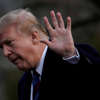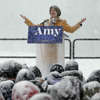AdChoices 
In Closed Hearing, a Clue About ‘the Heart’ of Mueller’s Russia Inquiry
SHARON LaFRANIERE, KENNETH P. VOGEL and SCOTT SHANE
27 mins ago

Trump signals national emergency is on his mind as budget talks stall

Minnesota Sen. Amy Klobuchar joins 2020 presidential race


Sam Hodgson for The New York Times Paul Manafort, the Trump campaign chairman at the time, preparing for an interview ahead of the Republican National Convention in July 2016.
WASHINGTON — Of the few hints to emerge from the special counsel, Robert S. Mueller III, about evidence of possible collusion between President Trump’s campaign and Russia, one of the most tantalizing surfaced almost in passing in a Washington courtroom last week.
Comments by one of Mr. Mueller’s lead prosecutors, disclosed in a transcript of
a closed-door hearing, suggest that the special counsel continues to pursue at least one theory: that starting while Russia was taking steps to bolster Mr. Trump’s candidacy, people in his orbit were discussing deals to end a dispute over Russia’s incursions into Ukraine and possibly give Moscow relief from economic sanctions imposed by the United States and its allies.
The theory was offered almost as an aside by the prosecutor, Andrew Weissmann, during a discussion of contacts between Mr. Trump’s former campaign chairman, Paul Manafort, and a longtime Russian associate,
Konstantin V. Kilimnik, whom investigators have linked to Russian intelligence.


Sergey Ponomarev for The New York Times Russian soldiers guarding a Ukrainian military base in Crimea in March 2014, the year Russia annexed the territory.
A closer look at the transcript, released late Thursday, shows that the prosecutors have been keenly focused on discussions the two men had about a plan to end the conflict that followed Russia’s invasion of Ukraine and annexation of Crimea in 2014. Persuading the United States to ease or end the American-led sanctions imposed to punish Moscow for its aggression has been a primary goal of Russian foreign policy.
According to the transcript, which was heavily redacted, Mr. Manafort and Mr. Kilimnik repeatedly communicated about a so-called peace plan for Ukraine starting in early August 2016, while Mr. Manafort was still running Mr. Trump’s campaign, and continuing into 2018, months after Mr. Manafort had been charged by the special counsel’s office with a litany of crimes related to his work in the country. The prosecutors claim that Mr. Manafort misled them about those talks and other interactions with Mr. Kilimnik.


Sam Hodgson for The New York Times. Michael T. Flynn, left, President Trump’s first national security adviser, with Michael D. Cohen, center, Mr. Trump’s longtime fixer, and Rick Perry, the energy secretary, in 2016.
Pressed by the judge at Monday’s hearing to say why Mr. Manafort’s alleged lies mattered, Mr. Weissmann gave a broad hint about the thrust of the investigation.
“This goes to the larger view of what we think is going on, and what we think is the motive here,” Mr. Weissmann said. “This goes, I think, very much to the heart of what the special counsel’s office is investigating.”
Mr. Weissmann did not elaborate. The hearing’s purpose was narrow — determining whether Mr. Manafort had breached his plea agreement by misleading the prosecutors about Mr. Kilimnik and other matters. Mr. Kilimnik was
charged last June with conspiring with Mr. Manafort to obstruct justice by trying to shape the accounts of prospective witnesses in Mr. Manafort’s case.
Yet Mr. Weissmann’s cryptic comments suggest that the special counsel’s investigation — which Mr. Trump has sought to dismiss as a witch hunt and which the acting attorney general, Matthew G. Whitaker,
has said will wrap up soon — is still pursuing the central question of whether there was some kind of deal between Russia and the Trump campaign.


Joseph Sywenkyj for The New York Times The building in Kiev, Ukraine, that housed Mr. Manafort’s political consulting and advising business.
To date, prosecutions by the special counsel have skirted that question. They have laid out Russia’s hacking, leaking and social media manipulation, most of it in favor of Mr. Trump. They have charged multiple Trump aides with lying, including the president’s first national security adviser, Michael T. Flynn, who admitted misleading the F.B.I. about his discussions with the Russian ambassador about sanctions.
Mr. Trump’s longtime friend Roger J. Stone Jr. was
indicted last month on charges of lying to Congress about his efforts to contact WikiLeaks, which released tens of thousands of Democratic emails stolen by the Russians.
But the essential question of why the Kremlin bet so heavily on Mr. Trump, and whether President Vladimir V. Putin of Russia had any indication that Mr. Trump would give him what he desired, has remained unresolved.
Senator Richard M. Burr of North Carolina, a Republican who is the chairman of the Senate Intelligence Committee,
told CBS News on Thursday that, based on the evidence they have seen so far, the committee’s investigators “don’t have anything that would suggest there was collusion by the Trump campaign and Russia.”
But Mr. Weissmann’s remarks seem to suggest that for the special counsel, at least, that avenue of inquiry is still alive.


James Hill for The New York Times Banners in Red Square in Moscow in March 2014 with President Vladimir V. Putin’s portrait and the slogan “We Are Together,” referring to Russia and Crimea. The sanctions have inflicted substantial pain on the Russian economy. As a candidate and a new president, Mr. Trump seemed skeptical that such punishment was necessary or effective.
“Trump’s unusual sympathy and receptivity to Putin and the Kremlin was evident throughout the campaign” and the first few months of his presidency, said John E. Herbst, a former United States ambassador to Ukraine. That pattern, he said, fueled the notion that Mr. Trump might seek a “grand bargain” that would end sanctions, possibly on terms deeply unfavorable to Ukraine.
The sanctions also limited business opportunities with Russia. Mr. Trump had long sought
a marquee Trump Tower project in Moscow, and at least two aides were pursuing separate nuclear power projects that would have benefited from an end to the sanctions.
As Mr. Trump took office, some State Department officials
described worrying inquiries that suggested the White House might be preparing to precipitously drop the sanctions. And various intermediaries floated proposals they said would end the sporadic combat in eastern Ukraine between Russian-funded separatist fighters and Ukrainian forces trying to hold back the loss of more territory.
Michael D. Cohen, Mr. Trump’s longtime fixer, told The New York Times that
he left a sealed envelope containing one such plan on Mr. Flynn’s White House desk.
Mr. Kilimnik, meanwhile, was trying to use his extensive ties to Mr. Manafort to advance another. It envisioned the return of Viktor F. Yanukovych, a pro-Russia politician who had risen to the presidency of Ukraine in 2010 with the help of Mr. Manafort, who was paid tens of millions of dollars for his efforts.
Mr. Yanukovych was forced from office by a popular uprising in 2014 and fled to Russia. Mr. Kilimnik wanted to resurrect him as a semiautonomous leader in eastern Ukraine, a division of the country fiercely opposed by most Ukrainians.
In a February 2017 interview with The Times, Mr. Kilimnik described Mr. Manafort as a possible negotiator for the deal. He said that Mr. Manafort had told him that “there is only one enemy — the chaos.”
“If there is a serious project that can bring peace to Ukraine, Manafort will be back,” Mr. Kilimnik said at the time.
The first discussion between Mr. Manafort and Mr. Kilimnik cited by the prosecutors took place on Aug. 2, 2016, at the Grand Havana Room in Manhattan, and also included Rick Gates, Mr. Manafort’s deputy on the Trump campaign and during his Ukraine work. Mr. Weissmann noted that Mr. Manafort and Mr. Gates tried to avoid drawing attention at that meeting, leaving separately from Mr. Kilimnik.
“That meeting and what happened at that meeting is of significance to the special counsel,” Mr. Weissmann said at the hearing.
Mr. Manafort initially told prosecutors he had dismissed Mr. Kilimnik’s proposal out of hand, Mr. Weissmann said. In fact, according to the transcript, Mr. Manafort and Mr. Kilimnik talked about the proposal again in December 2016; in January 2017, when Mr. Kilimnik was in Washington for Mr. Trump’s inauguration; and again in Madrid the next month.
Mr. Weissmann noted that those talks went forward despite the “enormous amount of attention” in the United States at the time to contacts between Russians and Trump associates.
Mr. Manafort’s lawyer, Richard Westling, suggested the discussions were not all that memorable to Mr. Manafort because he had minimal interest in advancing Mr. Kilimnik’s plan. Although the two men revisited the proposal after Mr. Trump’s election, he said, “there is no real follow through.”
Mr. Westling said it was not the only such plan afloat — nor was it the only one proposed by Mr. Kilimnik, who has denied having ties to Russian intelligence. Kevin Downing, another lawyer for Mr. Manafort, argued that suspicions about Mr. Kilimnik’s communications were “nonsense” because “the sanctions were going to continue against Russia” whether or not Mr. Trump was elected.
What Mr. Manafort and Mr. Kilimnik discussed about the Russia-Ukraine conflict is not all that concerned prosecutors. Another issue is a directive from Mr. Manafort to Mr. Gates to turn over Trump campaign polling data to Mr. Kilimnik in the midst of the presidential race.
The transcript suggests that Mr. Manafort claims that he wanted only public data transferred. But Mr. Weissmann told the judge that the question of whether any American, wittingly or unwittingly, engaged with Russians who were interfering in the election relates to “the core” of the special counsel’s inquiry.
Mr. Manafort’s allies argue that prosecutors have not proved that Mr. Kilimnik was linked to Russian intelligence, and have suggested that he interacted with the United States Embassy in Kiev. They noted that he traveled freely to the United States and had communications with the State Department.
But Judge Amy Berman Jackson seemed to agree with prosecutors that whether Mr. Manafort lied about his contacts with Mr. Kilimnik was important, saying at one point, “I am, actually, particularly concerned about this particular alleged false statement.”
During the hearing, prosecutors suggested that Mr. Manafort was to be a spokesman in the United States, apparently for Mr. Kilimnik’s plan to divide Ukraine.
“If he were the spokesperson, and denominated as such within the United States,” Mr. Weissmann said, “he would also have access to senior people.” He then broke off, saying, “That’s as far as I can go.”
Follow Sharon LaFraniere, Kenneth P. Vogel and Scott Shane on Twitter: @SharonLNYT, @KenVogel and @ScottShaneNYT. Andrew Kramer and Julia Mendel contributed reporting from Kiev, Ukraine





